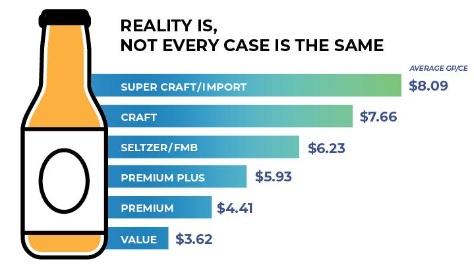There is more than meets the eye to an incentive plan
An effective salesperson incentive structure should be designed to influence the desired behaviors and outcomes for the sales team. This can include setting specific sales targets or quotas for individual salespeople or for the team as a whole, as well as providing incentives for meeting or exceeding these targets.
One common approach to incentive design is to offer commissions or bonuses based on the sales volume or revenue generated by the salesperson. This provides a direct financial incentive for the salesperson to increase their sales efforts and can be an effective way to motivate them to reach their goals.
In beverage distribution, it is important to recognize that not all cases sold are equal in terms of their profitability. This presents a challenge when designing an incentive structure for salespeople, as it may be tempting to simply focus on the volume of cases sold as the primary measure of success.
However, there is an opportunity to incorporate this challenge into the incentive structure in a way that encourages salespeople to focus on selling higher value products, while still providing motivation to sell a sufficient volume of lower value products to meet their targets.
Sales rep return on effort
Have you ever thought about how you get your sales team to put the right effort into the outcomes you are looking for? Consider your plan in the context of return on effort. When paying sales reps to focus on high-end items, it’s important to consider the gap between the commission earned for selling easy-to-sell products like Bud Light or Miller Light versus the effort required to sell a higher-end, local or regional craft product. If the gap is too small, sales reps may be motivated to focus on the easier sales rather than putting in the extra effort to sell higher-end products.
One approach that distributors may take to address the pay gap and focus on high-end items is through the use of MBOs, or Monthly Business Objectives. In this approach, specific targets or quotas are set for individual sales reps or for the team as a whole, and incentives are provided for meeting or exceeding these targets. This can help to motivate sales reps to focus on high-end products and put in the extra effort required to sell them.
What about total dollar sales?
A distributor who believes they have solved the problem of return on effort by paying commissions on dollar sales rather than case volume may initially see positive results. This approach can provide a strong financial incentive for sales reps to focus on selling higher value products and may lead to an increase in overall profitability for the organization.
However, it’s important to recognize that this approach may also have some limitations and may not completely address the issue of sales reps understanding that not all cases result in equal profit. For example, sales reps may still be motivated to sell lower value products in order to meet their targets or quotas, even if this does not align with the overall goals and objectives of the organization.
In addition, this approach may not adequately compensate sales reps for the extra effort required to sell higher value products. If the effort required to sell a premium product is significantly greater than the effort required to sell a lower value product, the sales rep may not feel fairly compensated for their efforts.
Not all cases are equal
To understand the concept of not all cases being created equal, let’s consider the following two examples:
Example 1: A premium light lager brand offers both 24 oz cans and 2/12pk bottles. The full price case for the cans is only 50 cents more expensive than the bottles, but the gross profit per CE is $1.19 higher for the bottles. This illustrates the importance of considering the profitability of each case rather than simply focusing on the volume of cases sold.
Example 2: A regional craft brand offers 19.2 oz packages. When compared to a premium brand’s 24 oz package, the regional craft package generates 35% more revenue for the sales rep in terms of topline commission, but 69% more profit for the distributor. This highlights the importance of aligning the interests of the sales reps with the overall goals and objectives of the organization. By selling higher value cases, sales reps can not only increase their own commissions, but also contribute significantly to the overall profitability of the company.

In both of these examples, it is clear that not all cases are created equal in terms of their value and profitability. It is important for distributors to consider these differences when designing an incentive structure and to properly recognize and compensate sales reps for the extra effort required to sell higher profit cases.
Can I transform my team?
Sales transformation is crucial for companies looking to optimize their sales efforts and drive profitable growth. However, many distributors are uncertain about how to approach this challenge.
The VXP team is a group of consultants who can help bring sales transformation to your company. With expertise in the VXP system, a powerful tool that helps sales reps understand the value of each case and the efforts required to sell them, the VXP team can work with your company to identify the most effective efforts to drive profitable growth.
By taking a holistic view of your company, the VXP team can help you understand your business goals and objectives, and develop customized strategies to achieve them. With the guidance of the VXP team, you can optimize your sales efforts and drive profitable growth, while also helping your sales reps understand the value of each case and the importance of focusing on higher value items.
Contact us for a discovery call today.
